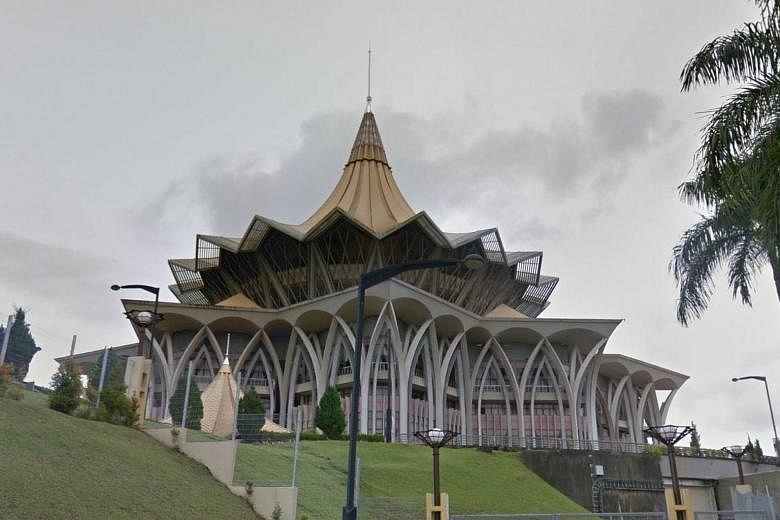KUCHING, SARAWAK - Campaigning gets under way on Monday (Dec 6) in Sarawak for much-delayed elections in Malaysia's biggest and oldest state legislature which could have larger ramifications for the fluid national political landscape.
Sarawak has 82 seats in its state assembly, by far the biggest in Malaysia.
And even before candidates are named on Monday, it is already promising to deliver a crowded electoral field, with multi-cornered contests expected in most seats.
The election could have consequences for the leadership of federal opposition bloc Pakatan Harapan (PH), whose electoral performance has been on the wane ever since its shock win at the 2018 national polls.
It could also signal the mushrooming of more regional parties in coalitions in Borneo, with Malaysia on the cusp of amending its constitution to elevate the status of Sabah and Sarawak within the federation, and give more autonomy to both states.
Sarawak has 31 seats in the 222-seat Malaysian Parliament, the most of any state.
This will be the first state election that Gabungan Parti Sarawak (GPS), the incumbent state government of Sarawak, will contest under its own banner and a new logo, after leaving the federal Barisan Nasional (BN) coalition and rebranding as an independent regional coalition.
The four local parties in GPS, which held 67 of the 82 seats in the assembly before it was dissolved last month, will contest all seats, with the lion's share going to Parti Pesaka Bumiputera Bersatu (PBB), vying in 47.
However, GPS's regional approach will be matched by Sarawak-based opposition party Parti Sarawak Bersatu (PSB), a two-year-old party contesting polls for the first time and which already has several key former state and federal leaders on its roster.
PSB secretary-general George Lo told The Straits Times that his party believes Sarawakians would rather support a Sarawak-based party than PH, a collection of peninsula-based parties with a presence in Sarawak.
PSB is contesting 70 seats in the election, making it the single party with the most candidates .
However, analysts believe the election will see a handsome win for the GPS coalition, which will be strengthened by its incumbency, a possible low turnout due to Covid-19 protocols, and the potential vote splitting between opposition parties in multi-cornered fights.
Still licking its wounds from its defeat at the recently concluded Melaka polls, PH, led by opposition leader Anwar Ibrahim, is likely to contest just over half the seats on offer, with his own party Parti Keadilan Rakyat (PKR) in 27 seats, and PH partner Democratic Action Party (DAP) contesting 26.
The other PH party, Amanah, has said it will stand in nine, although it has not announced candidates.
GPS, for its part, has largely managed to steer clear of complications that would have split its votes.
BN and Parti Pribumi Bersatu Malaysia, GPS' two partners in the federal government, have opted to sit out the Sarawak polls and support GPS instead.
However, Islamist party Parti Islam SeMalaysia, which is also part of the federal government, is contesting one seat at Beting Maro in the town of Sri Aman, three hours from state capital Kuching.
In any case, "GPS will still win two-thirds majority in the worst case scenario", said Dr Jeniri Amir, a Sarawak-based analyst and senior fellow at the Malaysian Council of Professors, an academic collective.
Dr Jeniri ruled out the chances of PKR, PAS and other Sarawak-based parties that are also contesting the elections making much ground.
While Datuk Seri Anwar's PKR won three seats in the last state elections in 2016, all three incumbent assemblymen have now left the party. It is also without a state chairman since the collapse of the PH government last year.
Another weak showing by PKR could have ramifications for Mr Anwar, whose leadership in PH is under question following the Melaka defeat.
Instead, the strongest opposition party in Sarawak will remain the DAP, followed by PSB, said Dr Jeniri.
"The fight is really between GPS, DAP and PSB," he said.
Universiti Malaya political analyst Awang Azman Pawi told ST that the best case scenario for PH would be to retain its seats in the assembly, which would still render a convincing win for GPS.
Sarawak is also set to see similar Covid-19 protocols to the Melaka election reimposed there, with traditional campaigning and speeches banned in all urban constituencies.
The Election Commission on Sunday however allowed speeches and campaigning to be conducted at 64 semi-rural and rural constituencies that it said had poor 4G connectivity, making social media campaigns untenable.
The commission has also limited the number of leaders who may enter Sarawak to campaign for the contesting parties.
Only five designated top leaders from each party will be allowed, which essentially will restrict many non-Sarawakian politicians from campaigning in the state.
However, the incumbent government's advantages are still visible under the protocols, as several federal ministers, including Prime Minister Ismail Sabri Yaakob, have visited Sarawak over the past few days, launching mega projects and attending events.
"There should not be double standards of protocols. The same should apply to everyone. Don't have one rule for the ministers and incumbents and another for the opposition," said Sarawak PKR acting chairman Abang Zulkifli Abang Engkeh, who is contesting Beting Maro alongside PAS and GPS.
Mr Awang Azman said that historically, voter turnout at Sarawak election has averaged only 68 per cent, and this election could see a turnout lower than that. The Election Commission has targeted a 70 per cent turnout.
The Melaka polls saw a voter turnout of only 66 per cent, which potentially helped the incumbent state government led by BN to a handsome win.


